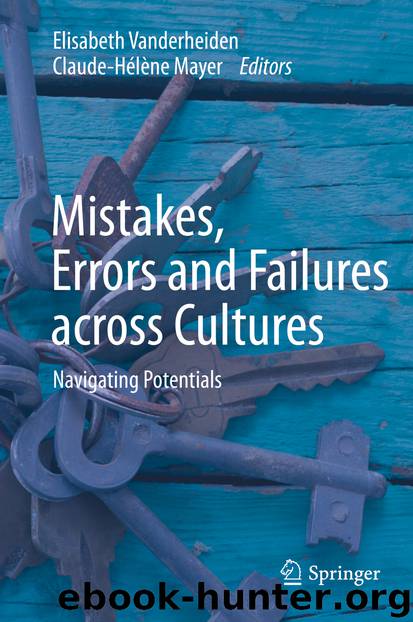Mistakes, Errors and Failures across Cultures by Elisabeth Vanderheiden & Claude-Hélène Mayer

Author:Elisabeth Vanderheiden & Claude-Hélène Mayer
Language: eng
Format: epub
ISBN: 9783030355746
Publisher: Springer International Publishing
Every human talent means – from a Christian point of view – great (and also moral) responsibility towards God, ourselves and others. Because other lives and fates may depend on one’s actions. The answer to mistakes must be justice and mercy in equal measure.
15.7 Focus on Justice and Mercy
Legal or other sanctions in the sense of justice can produce a learning effect in humans as well as gifted and unexpected mercy and forgiveness. For example, Thomas Aquinas identified transactional justice (in Latin, iustitia commutativa) with recourse to Aristotle as a fundamental value. According to this a mistake must have an adequate penalty as a consequence. Taking this into consideration there must be rules (such as laws) to prevent arbitrariness. They are considered fair from a Christian point of view when they correspond to salvific purpose of humans. Salvation of man through God means in the moment of the last judgment the salvation of man, despite his mistakes.8 In earthly existence, the free-deciding and thus responsible person should also be empowered by rules to hear the call of God and to say yes to God. There is no safe guarantee for this salvation in the end. It matters how people live here. God takes our freedom and responsibility seriously. Therefore, from the Christian point of view, the final judgment of God will be closely related to man’s earthly life. How exactly this judgment looks like remains speculative and can only be approximated in ecclesiastical life. God Himself is the judge with infinite freedom that transcends all human and theological thinking and speculation.9 God’s judgment must and cannot be anticipated on earth. Righteous retaliation or punishment are not simply determined by this. However, they must not go beyond the commandment of the iustitia commutativa (for instance, in the sense of a retaliation or an example set as a deterrent) and must always consider mercy towards the person concerned (cf. Kasper, 2012, 187; Benedict XVI., 2005). Punishment as a response to mistakes is therefore justifiable in Christian terms but must be moderate. God does not deprive his love, even if you make mistakes.10
Moral mistakes (such as intrigue, aggression, ambush, false testimony, broken promises, etc.) not only damage the relationship with God but also destroy one’s relationship with others and with oneself. Such self-inflicted bondages cannot be overcome alone (cf. Schockenhoff 2007, 365 f.), either the non-sacramental tradition of Luther or the sacramental tradition (Catholic and Orthodox) know about reconciliation. I propose this reconciliation logic for moral mistakes as a systematic orientation for a Christian mistakes-culture and refer especially on the Catholic tradition, which is my focus. I will now sketch it out to relate it to other types of mistakes beyond the narrow theologic context of morality and sacraments. Catholic penance consists of four steps:111.Repentance: It describes a guilty person’s honest feeling of pain about the moral mistake. It also implies the serious intention to do better in the future. 12
Download
This site does not store any files on its server. We only index and link to content provided by other sites. Please contact the content providers to delete copyright contents if any and email us, we'll remove relevant links or contents immediately.
Bullshit Jobs by David Graeber(4177)
Radical Candor by Kim Scott(2709)
I Am Right, You Are Wrong by Edward De Bono(2438)
23:27 by H. L. Roberts(2245)
Nomadland by Jessica Bruder(2058)
Average Is Over by Tyler Cowen(1844)
The Conflict Resolution Phrase Book by Barbara Mitchell & Cornelia Gamlem(1770)
Out of Our Minds: Learning to Be Creative by Ken Robinson(1728)
High-Impact Interview Questions by Victoria A. Hoevemeyer(1689)
The Ideal Team Player by Patrick M. Lencioni(1637)
An Everyone Culture: Becoming a Deliberately Developmental Organization by Robert Kegan & Lisa Laskow Lahey(1631)
Who Moved My Cheese?: An Amazing Way to Deal With Change in Your Work and in Your Life by Johnson Spencer(1628)
The Asshole Survival Guide by Robert I. Sutton(1597)
Automatic Society by Bernard Stiegler(1547)
Unleashed by Anne Morriss & Frances Frei(1538)
Who by Street Randy & Smart Geoff(1501)
42 Rules of Employee Engagement by Susan Stamm(1462)
96 Great Interview Questions to Ask Before You Hire by Paul Falcone(1444)
Fish! by Stephen C. Lundin(1397)
